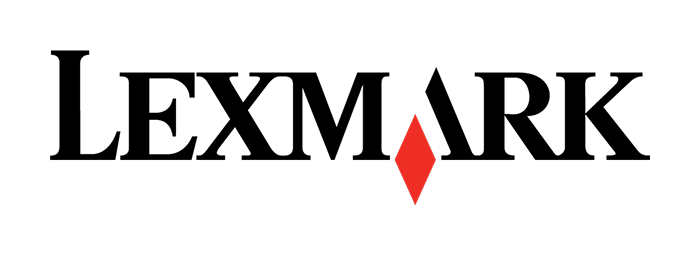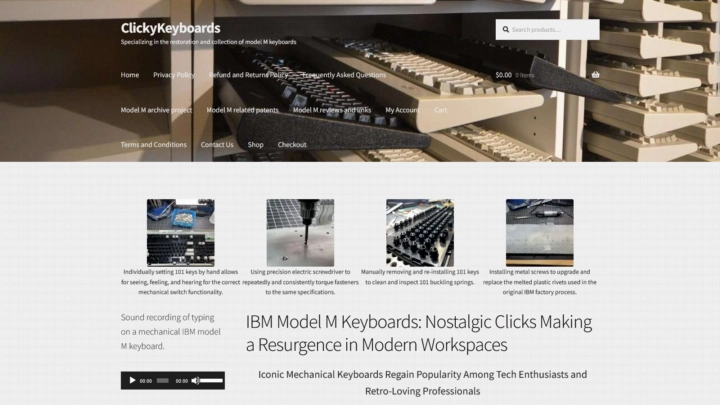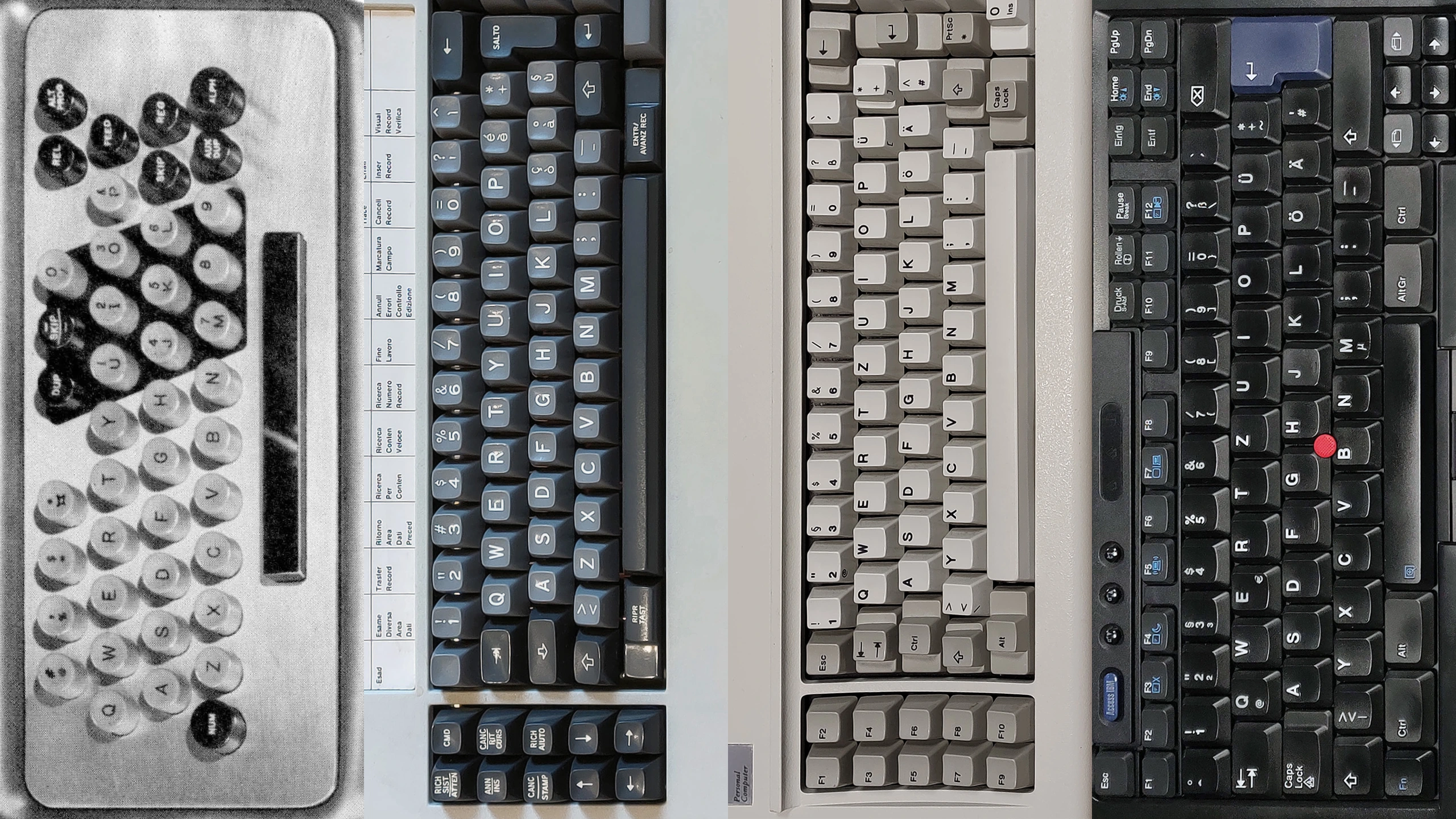A timeline of IBM keyboard history
The IBM and family keyboard timeline is an illustrated overview of some of the most important events affecting IBM, Lexmark, Unicomp, Lenovo and Toshiba Global Commerce Solutions keyboards. This includes notable keyboard releases and withdrawals, corporate history like company founding, divestures and change in OEMs, and patents. Due to their relationship and impact on the keyboards around them, host devices such as personal computers, terminals, consoles and typewriters also appear throughout the timeline. 144 events have been recorded for the "show all" versions of the timeline.
Herman Hollerith, a pioneer of punched card technology, founds the Tabulating Machine Company to market his inventions. Its equipment will quickly gain ground with being used for many countries' censuses, including notably the USA's 1900 census.
Computing-Tabulating-Recording Company (CTR) is founded by Charles R. Flint upon consolidating Herman Hollerith's The Tabulating Machine Company with Bundy Manufacturing Company, International Time Recording Company and the Computing Scale Company of America. CTR specialises in recording-keeping and measuring systems.
The Computing-Tabulating-Recording Company is renamed the International Business Machines (IBM) Corporation under the presidency of Thomas J. Watson Sr.
IBM acquires Electromatic Typewriters, Inc. to gain a head start with their typewriter ambitions, gaining Electromatic's patents, production facilities and tooling. IBM will invest $1 million in redesigning their product and improve support infrastructure for them.
IBM Canada opens the 844 Don Mills Road, Toronto, Ontario plant (plant 91). This plant will go on to play a minor role in Model M production via the IBM 4680 POS Alphanumeric Keyboard, likely producing their cover set and electronics whilst the rest was made by IBM Netherlands.
IBM United Kingdom opens the Greenock, Scotland plant (plant 55). Greenock became a major hub for manufacturing keyboards, personal computers, printers, terminals and typewriters destined to be sold in Europe, Middle East, and Africa (EMEA). It would go on to produce Model B, Model F and Model M keyboards and IBM ThinkPad notebook computers.
IBM United States opens the Lexington, Kentucky plant (plant 11). This plant became associated with the IBM Information Products Division and was a known major producer of IBM typewriters and keyboards for the North American market.
IBM Netherlands opens its second Amsterdam, North Holland, the Netherlands plant (plant 58). This plant served a major manufacturer of IBM Electric Typewriter Division and its successors products such as electric typewriters, producing two million of such by 1980. In the '80s, the plant diversified to produce electronic typewriters and keyboards including in the Model F and Model M families.
IBM renames its Electric Typewriter Division to Office Products Division (OPD). This change was made to reflect how this division's products were increasingly beyond the scope of just typewriters.
IBM United States opens the Charlotte, North Carolina plant and laboratory (plant 41). This plant became associated with the IBM Information Products Division and was known to manufacturer printers. From 1993, it likely had a peripheral involvement with the Model M keyboard family as many Model M-based IBM POS keyboards such as RPOS and MPOS will have Charlotte's plant code in their serial/ID numbers, implying at least a "location of control" relationship.
[1] IBM Mexico opens the Guadalajara, Jalisco plant (plant 78 or "IEP"). This plant was specifically made for producing personal computers and related peripherals for the Latin American market. IBM Personal System/2 Enhanced Keyboards were produced there between 1987 and 1995, with such keyboards affectionately known as a "Modelo M", referencing their Spanish-language rear labels.

IBM Information Products Corporation is divested to form Lexmark International. Lexmark inherited IBM United States' keyboard, printer and typewriter manufacturing operations and facilities in Boulder, Colorado and Lexington, Kentucky (plant 11).
Lexmark announces it will be ending its keyboard manufacturing business by April 1996 to focus on printers. IBM agreed to purchase from Lexmark $6.5 million worth of "certain keyboard assets, tooling, equipment, manufacturing information and licenses." Maxi Switch bought from Lexmark some manufacturing rights for IBM keyboards, patents (including one related to buckling springs), and assets for Lexmark Select-Ease Keyboards (Model M15) and rubber dome keyboards.

Lexmark exits the keyboard business. This resulted in the late Neil Muyskens (a former IBM and Lexmark engineer) founding Unicomp as Lexmark's keyboard business successor, continuing to produce various Model M variants in Kentucky, USA to this day, originally at 510 Henry Clay Blvd, Lexington, Kentucky 40505.
IBM relinquishes its in-house keyboard production capability after IBM United Kingdom's Greenock, Scotland plant (plant 55) stops producing Model M keyboards.

Brandon Ermita begins ClickyKeyboards (ClickyKeyboards.com) as a way of preparing for upcoming online academic database projects for Princeton University by documenting Model M keyboards. This will soon grow into a passion and business for restoring and selling Model M keyboards that is still going today, having since sold thousands of keyboards and became the most well-known of such restoration services.

Lenovo acquires IBM Personal Computing Division, gaining its ThinkPad brand, access to the SK-8835/SK-8840/SK-8845 keyboard family, various other relevant IP and personnel.

Toshiba TEC acquires IBM Retail Store Solutions, creating Toshiba Global Commerce Solutions (TGCS). TGCS inherited IBM's last remaining portion of the Model M keyboard family and now remains the only company marketing IBM buckling sleeve keyboards.
Lenovo acquires IBM x86 Server Business, receiving IBM's System x, BladeCenter and Flex System blade servers and switches, x86-based Flex integrated systems, NeXtScale and iDataPlex servers and associated software, blade networking and maintenance operations.
[ASK] Joe Strandberg (known as Ellipse on deskthority and geekhack) founds Model F Labs and begins the Brand New Model F Keyboards project. The original goal is to recreate the capacitive buckling spring and 472X-200 and 472X-300 type Model Fs with modernised electronics, and make them available at an affordable price. By the mid 2020s, the project will expand to include reproduction beam spring and Model M-esque capacitive buckling spring keyboards.
